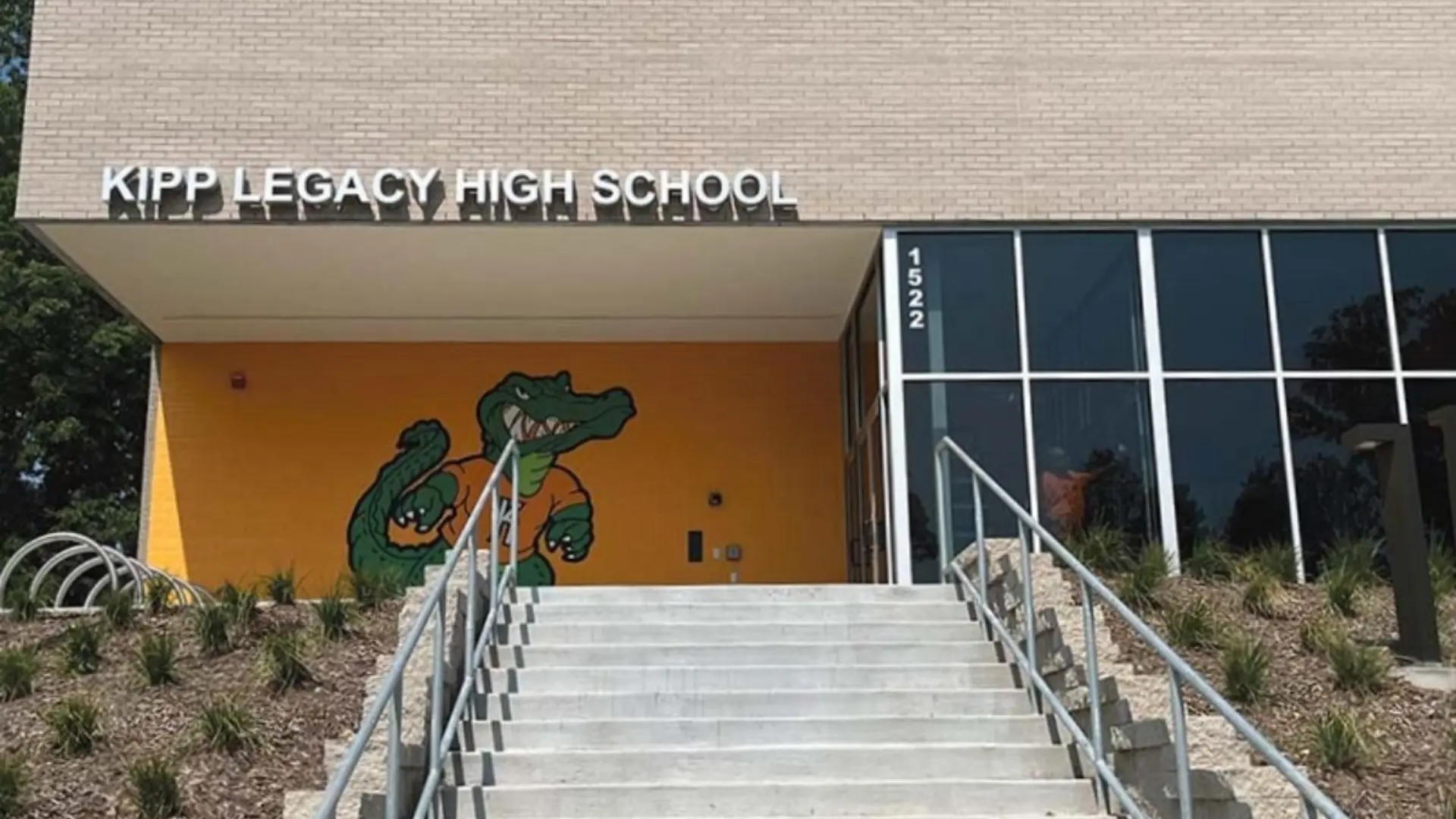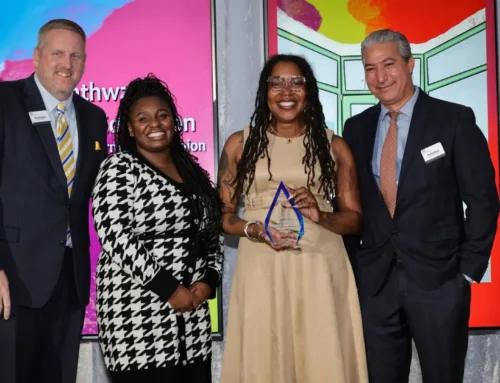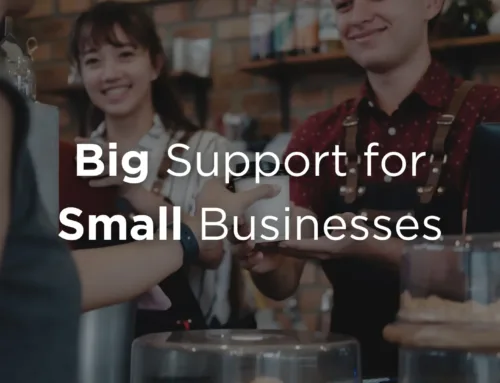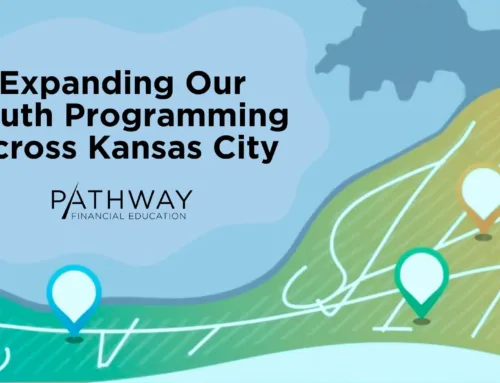
This spring, Pathway Financial Education reached a new milestone: our very first semester teaching personal finance in a high school classroom. In partnership with KIPP Legacy High School and Front Porch Alliance, we were invited to co-lead the junior seminar course, a space where students prepare for life beyond high school by exploring college and career options, refining essential skills, and, thanks to this collaboration, learning to manage their money with confidence.
From budgeting and credit to investing and real estate, this pilot program was more than just curriculum; it was a chance to build connections, shift mindsets, and prepare students for financial independence.
Why This Program Matters
When the semester began, we shared our excitement about the milestone:
“Financial literacy is the foundation for long-term success,” said LaTasha Jacobs, Executive Director at Pathway Financial Education. “Through this partnership with KIPP Legacy High School, we’re excited to help students build confidence and independence when it comes to managing their finances.”
This confidence was built through real-world application. Our team delivered a series of weekly lessons covering everything from budgeting and credit to investing and identity theft. The curriculum was developed to align with Missouri DESE personal finance standards and tailored to resonate with high school learners.
As part of the junior seminar class, Pathway was invited to support students in preparing for all aspects of life after high school—whether that means college, the workforce, or entrepreneurship.
“This course is designed to prepare our 11th grade students for not only senior year but also postsecondary pathways,” explained India Williams, Director of KIPP Forward. “Students get a snapshot of college & career readiness, ACT prep, goal setting, resume writing, interview skills… The unique addition PFE was able to provide was the personal finance essential framework.”
Meeting DESE Standards in a Real, Relevant Way
India also noted that Pathway’s involvement helped fill significant gaps in Missouri’s financial literacy standards.
“There were 25 [standards] we knew we could not address with our traditional staff. I can say with confidence [Pathway Financial Education] had resources for the majority of those remaining standards.”
Pathway focused on critical, often-overlooked areas, including:
-
Evaluating credit card and loan terms
-
Reading credit reports and understanding credit scores
-
Comparing financial institutions and APRs
-
Understanding mortgages, insurance, and capital markets
-
Protecting personal information online and preventing identity theft
These lessons weren’t hypothetical. Through budgeting simulations, real-world scenarios, and group discussions, students applied what they were learning to realistic situations, like renting an apartment, preparing for a job, or choosing a bank account.
A Community-Focused Collaboration
The partnership was about more than checking boxes. It was rooted in the goal of shifting mindsets and addressing long-standing barriers to financial opportunity in underserved communities.
“My primary goal… is to provide our students, who are predominantly Black and Brown, with a real-world financial understanding and professional connections,” said India. “While it can be fun to spend money, it’s just as crucial to learn how to save, invest, and plan for the future. This partnership is about planting seeds for long-term economic empowerment and shifting mindsets toward financial independence and generational wealth.”
In addition to Pathway’s sessions, students also participated in a financial literacy course through Front Porch Alliance using Junior Achievement’s curriculum. With stipends for participation and spending trackers built into their learning, students practiced applying budgeting and saving techniques to their everyday lives. Together, these two programs offered both conceptual understanding and hands-on experience.
Grounded in Relationships and Real Expertise
The Pathway portion of the course was led by Program Manager Angelique Cheatem, who guided students through each week’s topic with clarity, warmth, and a focus on real-life application. Her leadership ensured that each session was more than a lecture; it was a conversation.
Angelique brought years of experience in financial education into the classroom and made the curriculum approachable, especially for students learning these concepts for the first time. Her presence also helped build trust with students, creating an environment where they felt comfortable asking questions, sharing perspectives, and engaging meaningfully with the material.
According to the Senior Manager of Postsecondary Persistence and Success at KIPP, Jessica Gomes, students found the topics “meaningful and directly applicable to both their lives and the postsecondary planning that takes place in our Junior Seminar curriculum.” She added that students described Angelique as “dynamic and engaging” and genuinely looked forward to having her in class each Monday.
Culminating in Real-World Planning
Students completed the semester with a final applied learning project: a personal financial plan outlining their goals for the next 5–10 years. Plans included monthly budgets, savings goals, debt management strategies, career considerations, and long-term investment ideas, all tailored to their chosen post-high school path.
Students demonstrated impressive growth throughout the semester, developing vocabulary, building confidence, and asking deeper, more critical questions about financial systems and decision-making.
Looking Ahead
Reflecting on the program, India shared her hopes for what students will take with them, stating “My biggest hope for our students is aligned with our mission… after this class they feel prepared with the skills and confidence to pursue the paths they choose so they can lead fulfilling lives and build a more just world. Empowered!”
This semester was a powerful start to what we believe will be a long-term collaboration. At Pathway, we’re committed to supporting young people as they build the knowledge and tools needed for financial freedom, and this experience has only deepened our belief in the importance of early, relevant financial education.
We’re incredibly proud of what was accomplished alongside KIPP Legacy and Front Porch Alliance, and we’re already looking ahead to what’s next. We hope to continue and expand our partnership with KIPP next school year, reaching even more students and offering deeper learning opportunities. Long-term, we’re excited to bring this model to additional high schools and communities, ensuring that every student has access to the life-changing power of financial literacy.
This is just the beginning.




